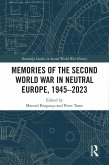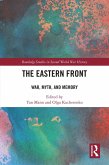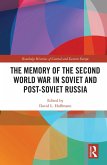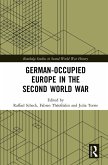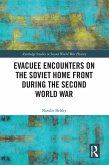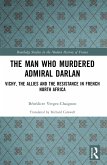Memories of the Second World War in Neutral Europe, 1945-2023 (eBook, ePUB)
Redaktion: Bragança, Manuel; Tame, Peter
41,95 €
41,95 €
inkl. MwSt.
Sofort per Download lieferbar

21 °P sammeln
41,95 €
Als Download kaufen

41,95 €
inkl. MwSt.
Sofort per Download lieferbar

21 °P sammeln
Jetzt verschenken
Alle Infos zum eBook verschenken
41,95 €
inkl. MwSt.
Sofort per Download lieferbar
Alle Infos zum eBook verschenken

21 °P sammeln
Memories of the Second World War in Neutral Europe, 1945-2023 (eBook, ePUB)
Redaktion: Bragança, Manuel; Tame, Peter
- Format: ePub
- Merkliste
- Auf die Merkliste
- Bewerten Bewerten
- Teilen
- Produkt teilen
- Produkterinnerung
- Produkterinnerung

Bitte loggen Sie sich zunächst in Ihr Kundenkonto ein oder registrieren Sie sich bei
bücher.de, um das eBook-Abo tolino select nutzen zu können.
Hier können Sie sich einloggen
Hier können Sie sich einloggen
Sie sind bereits eingeloggt. Klicken Sie auf 2. tolino select Abo, um fortzufahren.

Bitte loggen Sie sich zunächst in Ihr Kundenkonto ein oder registrieren Sie sich bei bücher.de, um das eBook-Abo tolino select nutzen zu können.
The book focuses on the six major European countries and states that remained officially neutral throughout the Second World War, namely Ireland, Portugal, Spain, Sweden, Switzerland, and the Vatican.
- Geräte: eReader
- mit Kopierschutz
- eBook Hilfe
Andere Kunden interessierten sich auch für
![Memories of the Second World War in Neutral Europe, 1945-2023 (eBook, PDF) Memories of the Second World War in Neutral Europe, 1945-2023 (eBook, PDF)]() Memories of the Second World War in Neutral Europe, 1945-2023 (eBook, PDF)41,95 €
Memories of the Second World War in Neutral Europe, 1945-2023 (eBook, PDF)41,95 €![The Eastern Front (eBook, ePUB) The Eastern Front (eBook, ePUB)]() The Eastern Front (eBook, ePUB)41,95 €
The Eastern Front (eBook, ePUB)41,95 €![The Memory of the Second World War in Soviet and Post-Soviet Russia (eBook, ePUB) The Memory of the Second World War in Soviet and Post-Soviet Russia (eBook, ePUB)]() The Memory of the Second World War in Soviet and Post-Soviet Russia (eBook, ePUB)41,95 €
The Memory of the Second World War in Soviet and Post-Soviet Russia (eBook, ePUB)41,95 €![German-occupied Europe in the Second World War (eBook, ePUB) German-occupied Europe in the Second World War (eBook, ePUB)]() German-occupied Europe in the Second World War (eBook, ePUB)41,95 €
German-occupied Europe in the Second World War (eBook, ePUB)41,95 €![Evacuee Encounters on the Soviet Home Front During the Second World War (eBook, ePUB) Evacuee Encounters on the Soviet Home Front During the Second World War (eBook, ePUB)]() Natalie BelskyEvacuee Encounters on the Soviet Home Front During the Second World War (eBook, ePUB)41,95 €
Natalie BelskyEvacuee Encounters on the Soviet Home Front During the Second World War (eBook, ePUB)41,95 €![The Man Who Murdered Admiral Darlan (eBook, ePUB) The Man Who Murdered Admiral Darlan (eBook, ePUB)]() Bénédicte Vergez-ChaignonThe Man Who Murdered Admiral Darlan (eBook, ePUB)41,95 €
Bénédicte Vergez-ChaignonThe Man Who Murdered Admiral Darlan (eBook, ePUB)41,95 €![World War II Historical Reenactment in Poland (eBook, ePUB) World War II Historical Reenactment in Poland (eBook, ePUB)]() Kamila Baraniecka-OlszewskaWorld War II Historical Reenactment in Poland (eBook, ePUB)41,95 €
Kamila Baraniecka-OlszewskaWorld War II Historical Reenactment in Poland (eBook, ePUB)41,95 €-
-
-
The book focuses on the six major European countries and states that remained officially neutral throughout the Second World War, namely Ireland, Portugal, Spain, Sweden, Switzerland, and the Vatican.
Dieser Download kann aus rechtlichen Gründen nur mit Rechnungsadresse in A, B, BG, CY, CZ, D, DK, EW, E, FIN, F, GR, HR, H, IRL, I, LT, L, LR, M, NL, PL, P, R, S, SLO, SK ausgeliefert werden.
Produktdetails
- Produktdetails
- Verlag: Taylor & Francis eBooks
- Seitenzahl: 330
- Erscheinungstermin: 12. Dezember 2023
- Englisch
- ISBN-13: 9781003827399
- Artikelnr.: 69505439
- Verlag: Taylor & Francis eBooks
- Seitenzahl: 330
- Erscheinungstermin: 12. Dezember 2023
- Englisch
- ISBN-13: 9781003827399
- Artikelnr.: 69505439
- Herstellerkennzeichnung Die Herstellerinformationen sind derzeit nicht verfügbar.
Manuel Bragança is an Assistant Professor in the School of Languages, Cultures and Linguistics at University College Dublin. His publications include The Long Aftermath (2016, with Peter Tame), Ego-Histories of France and the Second World War (with Fransiska Louwagie, 2018), and Hitler's French Literary Afterlives (2019). Peter Tame is an independent researcher, specialising in twentieth-century French literature and ideology. His principal publications include The Ideological Hero (1998), Isotopias: Places and Spaces in French War Fiction of the Twentieth and Twenty-First Centuries (2015), Mnemosyne and Mars (2013), and The Long Aftermath (2016).
Foreword: The search for neutrality in wartime. Introduction: European
neutrals in World War II and after: A balancing act Section I: Ireland /
Éire. 1. 'No useful purpose'? The Government Information Bureau (GIB) and
Irish neutrality 2. Forgotten Volunteers? Remembering and Recognising
veterans of the Second World War in the Republic of Ireland 3. The
Emergency's Improbable Frequency in Contemporary Irish Culture. Section II:
Portugal. 4. Portugal, World War II refugees and the Holocaust. History and
Memory 5. Portuguese Memorials of World War II, between Remembrance and
Oblivion 6. Memory works: The Changing Faces of Portugal's Neutrality in
recent Portuguese feature films and documentaries (1992-2017). Section III:
Spain. 7. Diplomats in the fray. The struggle to establish the legacy of
Spanish foreign policy during the Second World War 8. From Sepharad to the
Judeo-Masonic Conspiracy. Facts and Fictions on Spain and the Holocaust 9.
Neutrality of Spain in World War II: The Filmic Construction of a Myth.
Section IV: Sweden. 10. Archives on Victims of Nazism in Sweden: From Oral
History to Cultural Memory or Oblivion 11. Sweden, the War and the
Holocaust in post-war memory 12. On remembrance and forgetting: the Second
World War in Swedish memory culture. Section V: Switzerland. 13.
Switzerland and its neutral stance during World War II: a past that won't
go away 14. Memorials of World War II and the Holocaust in Switzerland 15.
Switzerland: The Policy of Neutrality and the Uses and Abuses of World War
II Memory. Section VI: The Vatican. 16. The papacy, the Catholic World, and
the memory of the Second World War 17. Vatican diplomacy on the razor's
edge: preserving neutrality and ecclesiastical heritage sites in Italy
during World War II 18. Telling children of neutral spaces in occupied
Rome. Memories of the Church, the Pope, and persecution. Afterword: The
Shadow of the Second World War on Neutral Europe.
neutrals in World War II and after: A balancing act Section I: Ireland /
Éire. 1. 'No useful purpose'? The Government Information Bureau (GIB) and
Irish neutrality 2. Forgotten Volunteers? Remembering and Recognising
veterans of the Second World War in the Republic of Ireland 3. The
Emergency's Improbable Frequency in Contemporary Irish Culture. Section II:
Portugal. 4. Portugal, World War II refugees and the Holocaust. History and
Memory 5. Portuguese Memorials of World War II, between Remembrance and
Oblivion 6. Memory works: The Changing Faces of Portugal's Neutrality in
recent Portuguese feature films and documentaries (1992-2017). Section III:
Spain. 7. Diplomats in the fray. The struggle to establish the legacy of
Spanish foreign policy during the Second World War 8. From Sepharad to the
Judeo-Masonic Conspiracy. Facts and Fictions on Spain and the Holocaust 9.
Neutrality of Spain in World War II: The Filmic Construction of a Myth.
Section IV: Sweden. 10. Archives on Victims of Nazism in Sweden: From Oral
History to Cultural Memory or Oblivion 11. Sweden, the War and the
Holocaust in post-war memory 12. On remembrance and forgetting: the Second
World War in Swedish memory culture. Section V: Switzerland. 13.
Switzerland and its neutral stance during World War II: a past that won't
go away 14. Memorials of World War II and the Holocaust in Switzerland 15.
Switzerland: The Policy of Neutrality and the Uses and Abuses of World War
II Memory. Section VI: The Vatican. 16. The papacy, the Catholic World, and
the memory of the Second World War 17. Vatican diplomacy on the razor's
edge: preserving neutrality and ecclesiastical heritage sites in Italy
during World War II 18. Telling children of neutral spaces in occupied
Rome. Memories of the Church, the Pope, and persecution. Afterword: The
Shadow of the Second World War on Neutral Europe.
Foreword: The search for neutrality in wartime. Introduction: European
neutrals in World War II and after: A balancing act Section I: Ireland /
Éire. 1. 'No useful purpose'? The Government Information Bureau (GIB) and
Irish neutrality 2. Forgotten Volunteers? Remembering and Recognising
veterans of the Second World War in the Republic of Ireland 3. The
Emergency's Improbable Frequency in Contemporary Irish Culture. Section II:
Portugal. 4. Portugal, World War II refugees and the Holocaust. History and
Memory 5. Portuguese Memorials of World War II, between Remembrance and
Oblivion 6. Memory works: The Changing Faces of Portugal's Neutrality in
recent Portuguese feature films and documentaries (1992-2017). Section III:
Spain. 7. Diplomats in the fray. The struggle to establish the legacy of
Spanish foreign policy during the Second World War 8. From Sepharad to the
Judeo-Masonic Conspiracy. Facts and Fictions on Spain and the Holocaust 9.
Neutrality of Spain in World War II: The Filmic Construction of a Myth.
Section IV: Sweden. 10. Archives on Victims of Nazism in Sweden: From Oral
History to Cultural Memory or Oblivion 11. Sweden, the War and the
Holocaust in post-war memory 12. On remembrance and forgetting: the Second
World War in Swedish memory culture. Section V: Switzerland. 13.
Switzerland and its neutral stance during World War II: a past that won't
go away 14. Memorials of World War II and the Holocaust in Switzerland 15.
Switzerland: The Policy of Neutrality and the Uses and Abuses of World War
II Memory. Section VI: The Vatican. 16. The papacy, the Catholic World, and
the memory of the Second World War 17. Vatican diplomacy on the razor's
edge: preserving neutrality and ecclesiastical heritage sites in Italy
during World War II 18. Telling children of neutral spaces in occupied
Rome. Memories of the Church, the Pope, and persecution. Afterword: The
Shadow of the Second World War on Neutral Europe.
neutrals in World War II and after: A balancing act Section I: Ireland /
Éire. 1. 'No useful purpose'? The Government Information Bureau (GIB) and
Irish neutrality 2. Forgotten Volunteers? Remembering and Recognising
veterans of the Second World War in the Republic of Ireland 3. The
Emergency's Improbable Frequency in Contemporary Irish Culture. Section II:
Portugal. 4. Portugal, World War II refugees and the Holocaust. History and
Memory 5. Portuguese Memorials of World War II, between Remembrance and
Oblivion 6. Memory works: The Changing Faces of Portugal's Neutrality in
recent Portuguese feature films and documentaries (1992-2017). Section III:
Spain. 7. Diplomats in the fray. The struggle to establish the legacy of
Spanish foreign policy during the Second World War 8. From Sepharad to the
Judeo-Masonic Conspiracy. Facts and Fictions on Spain and the Holocaust 9.
Neutrality of Spain in World War II: The Filmic Construction of a Myth.
Section IV: Sweden. 10. Archives on Victims of Nazism in Sweden: From Oral
History to Cultural Memory or Oblivion 11. Sweden, the War and the
Holocaust in post-war memory 12. On remembrance and forgetting: the Second
World War in Swedish memory culture. Section V: Switzerland. 13.
Switzerland and its neutral stance during World War II: a past that won't
go away 14. Memorials of World War II and the Holocaust in Switzerland 15.
Switzerland: The Policy of Neutrality and the Uses and Abuses of World War
II Memory. Section VI: The Vatican. 16. The papacy, the Catholic World, and
the memory of the Second World War 17. Vatican diplomacy on the razor's
edge: preserving neutrality and ecclesiastical heritage sites in Italy
during World War II 18. Telling children of neutral spaces in occupied
Rome. Memories of the Church, the Pope, and persecution. Afterword: The
Shadow of the Second World War on Neutral Europe.

